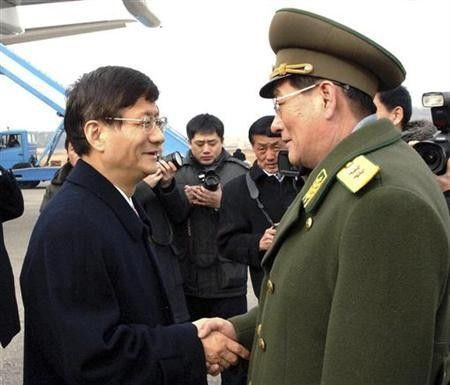China openly backs North Korea succession plan - report

A top Chinese official has backed ailing North Korean leader Kim Jong-il's plans to hand power to his son, the North's state media said on Tuesday, hailing the successful solution to allow continued socialist rule.
Meng Jianzhu, China's public security minister, congratulated Kim's youngest son Jong-un on his appointment as vice-chairman of the Central Military Commission last year, hailing the successful solution of the issue of succession to the Korean revolution, KCNA news agency reported.
Experts said the term succession did not refer directly to family rule, but was a commonly used expression referring to a continuation of the North's current political system.
(But) we can interpret that as a sign of acceptance on the part of China's political and power elite with regards to North Korea's succession, said Park Young-ho, of the Korea Institute for National Unification in Seoul.
Meng gave gifts to both Kim Jong-il, who celebrates his 69th birthday on Wednesday, and his son, KCNA reported.
Kim Jong-un was last year named as a four-star general and given high ranking political positions, signalling the start of the third-generation power transition in the secretive state.
Until the younger Kim's appointments, state media had never even reported the existence of Kim's children. Little is known about Jong-un other than that he is in his late twenties, and was educated in Switzerland.
China is the North's main ally and benefactor, and has stood by Pyongyang despite international criticism over the North's revelations last year of big advances in its nuclear programme, as well as two deadly attacks on the peninsula.
China provides more than 80 percent of the North's food and oil and has invested heavily in the isolated state in recent year, when Pyongyang has been under international sanctions for nuclear and missile tests.
The North's reclusive leader, suspected of having suffered a stroke in 2008, visited China twice last year, trips analysts and officials say were mainly aimed at winning Beijing's support for his hereditary succession process.
Beijing has nudged Pyongyang to change its ways and follow China's path of economic reform, but its paramount concern is stability and it sees a continuation of family rule as the best guarantee of this.
China worries that any regime change in the North could cause a flood of refugees to cross its border, precipitate reunification of the peninsula on the South's terms and bring American influence right up to its border.
Kim Jong-un was appointed in September as vice chairman of the Central Military Commission of the ruling Workers' Party, which oversees the North's 1.2 million-strong military headed by his father.
Meng is in the North Korean capital on the first leg of a tour that will also take him to Laos, Singapore and Malaysia.
© Copyright Thomson Reuters 2024. All rights reserved.





















